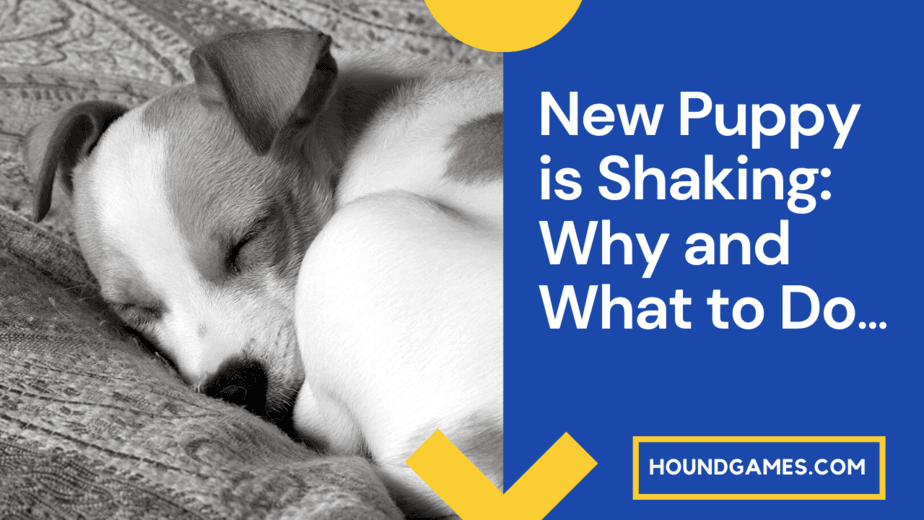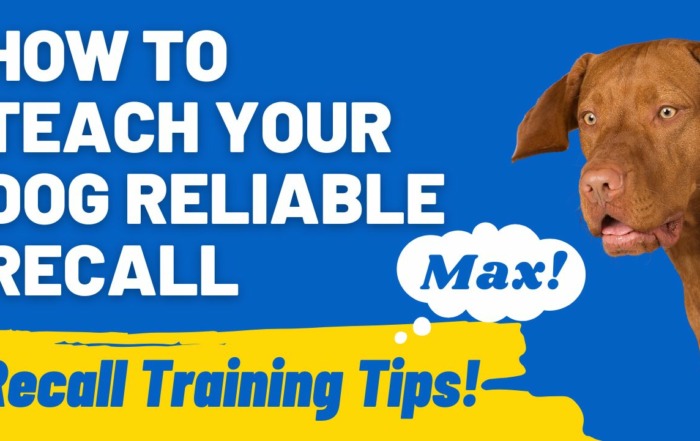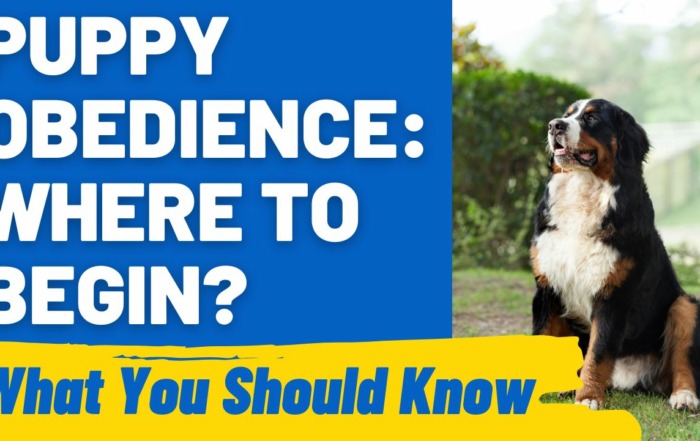When you bring home a new puppy, there is often a large adjustment period as you and your new puppy get used to your new life together. And it can be worrisome if your puppy appears to be doing something out of the ordinary, such as shaking, shivering, or trembling.
In this article, we will look at a few of the reasons why your new puppy may be shaking and trembling, and give you some ideas on how to fix the problem.
Why is My New Puppy Shaking
Shaking, shivering, trembling – they can all appear similar but occur for a variety of different reasons. It’s important to look at the whole context to determine why your puppy is shaking. Once you know why your puppy is shaking, you’ll be able to take steps to help them feel better.
Puppy is Too Cold
When you first bring your new puppy home, especially if they are the average 2-month-old puppy, they will likely be used to sleeping with their littermates and mother. This pile of puppies is nice and warm!
If your puppy is now sleeping by themselves, especially if they are small and have a short-haired coat, they may be shaking because they are cold.
The smaller your puppy, and the shorter their hair, the more likely it is that cold may be playing a part in their shivering.
You can easily tell if your puppy is shaking from the cold by making attempts to warm them up.
Moving their crate or pen to a warmer part of the house, wrapping your puppy in plenty of blankets, snuggling your puppy close for body heat, and placing a puppy-safe and warm stuffed animal with them are all ways you can try and warm your puppy up so they are comfortable.
You can also use a hot water bottle but make sure it’s only warm, or even warm a blanket up in the clothes dryer.
Some of the stuffed animals that are designed to help puppies feel warm and secure also make heartbeat sounds, to mimic the feeling of being in a pile with their littermates!
This Snuggle Puppy from Smart Pet Love is available on Chewy and can be a good option. (It’s also good for anxiety, so if this is the reason for your new puppy’s shivering, then this toy can help!)
We also recommend you read our post Is Your Puppy is Cold? How to tell and what to do…
If you’ve tried these steps and your puppy is still shivering, they are likely not shaking because they are cold. Instead, continue looking at some of the other reasons your puppy might be shaking further in this article.

Puppy is Scared
When your puppy is scared or in distress, they may also shake and tremble. The entire context is important to note when determining if your puppy is shaking because they are scared.
When dogs are scared, they often give off a variety of subtle signals and signs that they are stressed. Unless you know what you’re looking for, it can be easy to miss these stress signals.
Signs that your puppy is stressed, scared, anxious, or worried – beyond shaking – include:
-
Yawning when they aren’t tired
-
Licking their lips when there isn’t food around
-
Turning their head or body away from something
-
Being frozen or stiff, moving very little
-
Tucking their tail
-
Crouching and cowering
-
Pacing and can’t settle
-
Panting when they aren’t hot
-
Whale eye, where their pupils are very large and the whites of their eyes are showing
This is by no means an exhaustive list of the signs that your new puppy is stressed. However, if you see your puppy shaking while doing any of the rest of these signs, it’s likely that your puppy is scared.
It’s OK (and preferred) to comfort your puppy in this situation. Leaving your puppy to cry it out or figure it out on their own can lead to flooding, which can make the situation worse in the future.
When a dog experiences flooding, they are often so overwhelmed they can’t process the situation appropriately. They may “get over it” on occasion, but you also risk the problem becoming worse in the future.
You can try placing your new puppy in a location closer to you, leaving them with a stuffed animal that has a soothing heartbeat, playing background music, giving them a chew toy to keep themselves occupied, or otherwise ensure that your puppy’s basic needs are met so they can feel comfortable.
If you are struggling with your puppy feeling worried and anxious all the time, it’s a good idea to seek help from a professional trainer sooner rather than later.
A professional dog trainer, such as a Certified Professional Dog Trainer (CPDT-KA) or Certified Behavior Consultant Canine (CBCC-KA), can help you make sure you have a good plan for raising your puppy.
In more extreme cases where your new puppy has severe underlying anxiety – often due to genetics – a veterinary behaviorist can help you determine a training plan as well as offer advice on if any medications may be helpful.
If your puppy has weak back legs, then be sure to read about it in our post here.

Puppy is Hungry
In some cases, your new puppy may be shaking because they don’t have enough nutrients in their body. Small puppies are especially susceptible to low blood sugar, which can occur if they haven’t eaten enough, or recently enough.
Your puppy may also be suffering from diabetes, causing them to suffer from low blood sugar even more often than normal.
Shaking and trembling when your puppy is suffering from low blood sugar often looks like your puppy walking around “drunk” and stumbling.
In the moment, if your puppy is too disoriented to eat, you can rub Karo Syrup or honey on their gums. This boost of sugar can help your puppy feel better quickly.
You should also contact your puppy’s veterinarian if you notice them having a problem with low blood sugar. They’ll be able to best advise you on a feeding plan that keeps your puppy from suffering from low blood sugar attacks, as well as rule out a more serious cause, such as diabetes.
Puppy is Dreaming
If your puppy is sleeping, you may notice them trembling and even crying because they are dreaming. It can look and sound like your puppy is in distress, but it’s OK to let your puppy dream.
If you’re worried about your puppy, you can gently wake them up to bring them out of their dream. However, it’s not likely that dogs remember their nightmares as humans do, and it shouldn’t cause your new puppy any long-term distress.
It’s also important to remember that not all dogs are comfortable with being awoken from a deep sleep. Some dogs may be startled and react aggressively, so it’s important to carefully and gently wake your puppy up if you choose to do so.
Puppy is Excited
In some cases, shaking, trembling, and crying can occur when your puppy is excited! If you’ve ruled out a lot of the other reasons why your puppy may be shaking, and they are also showing other signs of being excited, they may just be happy and playful.
If your puppy is truly shaking because they are excited, you should also see your puppy actively trying to go say hi to someone or something, and appearing excited in general.
It can sometimes be difficult to distinguish if your puppy is excited, or if they’re frantic and anxious.
Watch for the signs in the list above to determine if they are anxious and stressed. If your new puppy is shaking but is also wagging their tail and has a loose body, it’s likely they are simply very excited.
Puppy is Sick
Your puppy may shake, shiver, and cry when they are sick. There are a variety of ailments that can cause your puppy to tremble, so if you don’t see your new puppy’s shaking resolve after trying to soothe them in other ways, it’s important to see a veterinarian.
Shaking Puppy Syndrome
One medical reason for your puppy to be shaking is called Shaking Puppy Syndrome. In Shaking Puppy Syndrome, your dog’s nerves don’t function properly.
Instead of being covered with a sufficient layer of myelin – the fatty protective sheath that keeps the nerves secure – puppies with Shaking Puppy Syndrome have layers of myelin that are too thin.
This thin layer can cause the electrical impulses sent by your puppy’s nerves to get lost or misfire, causing the muscles to twitch and shake.
Puppies with this disease often begin to shake as early as 2 weeks of age, and also have other issues with balance and coordination.
There is unfortunately no treatment for Shaking Puppy Syndrome. However, most puppies are able to recover and live relatively normal lives.
Your puppy’s veterinarian will be able to help you determine if your puppy has Shaking Puppy Syndrome by ruling out a variety of other potential ailments, such as seizures, diabetes, or something that is causing your puppy pain.
This disease is hereditary, so it’s important to choose a puppy from parents who have been health tested to avoid this illness if it’s common in your puppy’s breed.
Recall Training Secrets: How to Teach Your Dog Reliable Recall
Teaching a dog recall is not just a basic obedience skill; it's a vital aspect of ensuring the safety and freedom of your beloved pet. Picture this: your dog is playfully chasing after a squirrel [...]
The Joy of Petting: How to Approach Dogs the Right Way
"Can I pet that dog?" is often the first thought that pops into our minds when we see a furry friend wagging its tail. The joy of petting a dog is unmatched, offering both the [...]
Puppy Obedience: Where to Begin? An Introductory Guide
Puppy obedience is more than just teaching commands. It's about nurturing a relationship based on mutual respect and understanding. It lays the foundation for a well-behaved adult dog and ensures a harmonious life together. In [...]
Understanding Canine Autism: Do Dogs Experience It?
Have you ever wondered, can dogs have autism? Autism, a complex condition often characterized by social and communication difficulties, is widely recognized in humans. But when it comes to our canine companions, the idea of [...]
How to Integrate Play and Exercise for a Healthier Dog?
Ensuring a healthy and fulfilling life for our dogs involves more than just regular feedings and routine check-ups. Integrating play and exercise into their daily lives plays a crucial role in maintaining their physical and [...]
Outdoor Adventures: How to Make the Most of Outdoor Play with Your Dog?
Engaging in outdoor play with your dog is more than just a fun way to pass the time; it's an essential part of their health and happiness. From frolicking in the local park to embarking [...]










